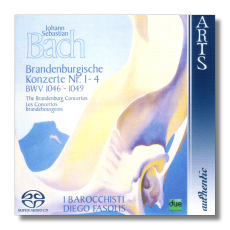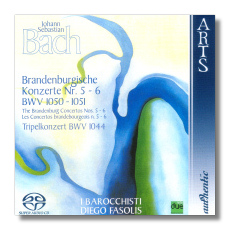
The Internet's Premier Classical Music Source
Related Links
- J.S. Bach Reviews
- Latest Reviews
- More Reviews
-
By Composer
-
Collections
DVD & Blu-ray
Books
Concert Reviews
Articles/Interviews
Software
Audio
Search Amazon
Recommended Links
Site News
 SACD Review
SACD Review
Johann Sebastian Bach

Brandenburg Concertos
- Brandenburg Concerto #1 for Violin, 2 Horns, 3 Oboes & Bassoon in F Major, BWV 1046
- Brandenburg Concerto #2 for Trumpet, Recorder, Oboe & Violin in F Major, BWV 1047
- Brandenburg Concerto #3 for 3 Violins, 3 Violas & 3 Cellos in G Major, BWV 1048
- Brandenburg Concerto #4 for Violin & 2 Recorders in G Major, BWV 1049
I Barocchisti/Diego Fasolis
Arts Blue Line 47715-8 Hybrid Multichannel SACD


- Brandenburg Concerto #5 for Flute & Violin in D Major, BWV 1050
- Brandenburg Concerto #6 for 2 Violas, 2 Viola da Gambas & Cello in B Flat Major, BWV 1051
- Triple Concerto for Flute, Violin, Harpsichord, Strings & Continuo BWV 1044
I Barocchisti/Diego Fasolis
Arts Blue Line 47716-8 Hybrid Multichannel SACD
With Vivaldi's Four Seasons, they are the most recorded works in the Baroque repertoire. Nevertheless, the six Brandenburg Concertos bring endlessly renewable joy, and it is always a pleasure to welcome a fine new version of them into the Bach discography.
I Barocchisti ("The Baroque-ists" – it works better in Italian!) are a Swiss ensemble. The booklet doesn't tell us anything about the instruments on which they are playing, but these obviously are period instruments, or copies thereof, and they are played more or less in the style of Bach's era. On the surface, there's little to distinguish I Barocchisti (or their performances) from similar ensembles who have sprung up in the past 15 or 20 years. However, there's much to praise about the details of the music-making on this CD. These works seldom have sounded so happy and so full of life. This is achieved only in part by brisk tempos, of which there are plenty on this pair of CDs. (However, the tempos don't sound as rushed as those of Musica Antiqua Köln, for example.) The rhythms are consistently springy, the phrasing is imaginative, and the dynamics, while not exaggerated, are varied enough to keep any listener's interest. Fasolis is not afraid to take some risks, and there are times in these performances where the execution is not as smooth as it might have been. Fasolis seems to have been unwilling to spoil a good time (for us, and for the musicians) at the expense of something so boring as technical perfection. Indeed, sometimes Fasolis and I Barocchisti almost get a little too cavalier or carried away. For example, the obstreperous horns in BWV 1046 really threaten to subvert the first and third movements as if they were drunken frat boys. In the second movement of BWV 1048, Duilio Galfetti (I think – he is the ensemble's leader) seems almost to have traded his violin for a fiddle and a jug of moonshine, so intoxicatingly slurred is his intonation. Is this what I Barocchisti are all about? Tellingly, they adopt a much more sober style in the Triple Concerto, although there's nothing boring about the musicianship here, either. I'm looking forward to hearing more of their recordings, of which there are many on the Arts label.
The German booklet notes, translated into English, French, and Italian, are by none other than Daniel Brandenburg! (It seems that he was the natural choice for this project.) On my CD player, this SACD produced wonderful detail and warmth, and I assume that it would sound even better on an SACD player.
Copyright © 2007, Raymond Tuttle




















